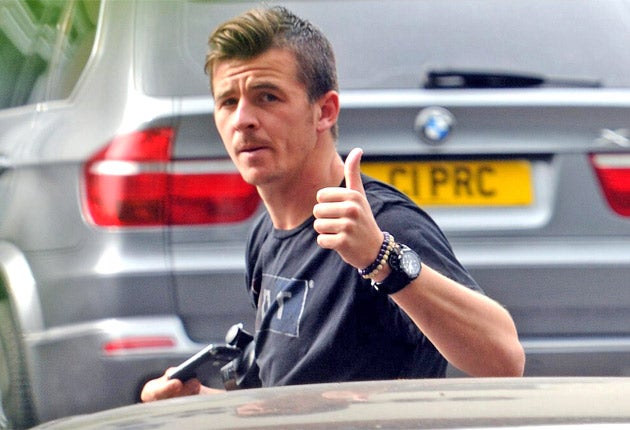James Lawton: Newcastle bad boy, for all his misdeeds, speaks truths the game should heed
In the middle of the game's most sustained burst of opportunism, Joey Barton sings of the glory of wearing the black and white stripes

Let's agree right away that any crusade launched under the banner of "Fair Play for Joey Barton" is unlikely to make overwhelming strides anywhere beyond the careworn terraces of Newcastle United.
Yet isn't there something about his latest rebellion that touches a certain chord of reality, even some rough decency, dare one say it, in the latest surreal approach of a Premier League season? This, no doubt, is a proposition just waiting to be invaded by gale-force cynicism.
There can certainly not be prizes for the intuition of anyone pointing out that if Barton and his agent had spent sleepless nights working out a plan to extend his career in the top flight at maximum profit, they could hardly have come up with anything better than the weekend of provocative tweeting that finally persuaded Newcastle owner Mike Ashley to tear up the last year of the player's contract.
Newcastle's long-abused fans lose their nearest thing to a working hero – but Barton walks into the certainty of a sweetheart deal with one of those clubs who know that if he brings some hellish baggage there is also a guarantee of something which has never been in such desperately short supply.
It is all the appearances of commitment to the ambitions of a club and the yearnings of their fans.
Of course, in the case of Barton the workings of devotion to the cause can be alarmingly brittle. Barton may have manfully battled both his addictions and his anger, and even his most venomous critics have to note a more than passing attempt to build on the wreckage of a shockingly violent past, but there is not much point in dismissing the possibility of fresh examples of recidivism.
Yet if Barton has admitted to doing some extremely bad things, it is also reasonable to note that from time to time he has a habit of sounding some notes that carry at least a suspicion of authenticity.
His most recent complaints about the Newcastle hierarchy, and the so far broken promise that the Andy Carroll windfall would be exclusively devoted to vital team building, may well have been a ploy aimed chiefly at enhancing his own bank balance. But if motives can be questioned, the fundamental strength of his arguments cannot.
Barton repaid the club which kept faith with him while he did his prison time with some extraordinary passion on the field, a fact noted by the fans when they voted him their player of the year. Earlier in his career the fans of Manchester City bestowed the junior version of that award when he fought for his place at that club.
There is something of a thread here, one that has to be woven into a life that has so often unravelled into the worst kind of anarchy.
Barton, for all his rampages on the street and sometimes gut-wrenchingly brutal discord with team-mates and opponents, has always tended to connect with the fans of the clubs who pay his wages.
It is probably this that resonates most powerfully in his latest controversy, coming as it does in the middle of perhaps the most sustained burst of career and financial opportunism in the history of the game. While such as Cesc Fabregas, Samir Nasri and Luka Modric strive to rid themselves of the affection and admiration they have created with their skills at the Emirates and White Hart Lane, and first Carlos Tevez and now Mario Balotelli make living in Manchester sound like one of the harder forms of purgatory, Barton sings of the glory of wearing the black and white stripes.
He also quotes George Orwell and some of the front-rank philosophers he has encountered since leaving school with a clutch of GCSEs. You may say that he has embarked on a fairly massive image refurbishment but the truth is that however crass and violent and, let's not be coy, despicable his behaviour, there has at times been more than a hint of a voice that might just be worth hearing.
This was Barton five years ago when England returned from a dismal World Cup campaign in Germany to a string of publishing parties attempting to boost some very slow-moving autobiographies: "England did nothing in the World Cup, so why were they bringing out books? 'We got beat in the quarter-finals, I played like shit. Here's my book.' Who wants to read that?
"If I'm buying a book I'll buy one about someone who has won something, not a book someone has written for the sake of it because their agent is telling them they can cash in on the England public because of the World Cup."
Now, the question is whether Joey Barton has made a point or pulled a stroke. Either way, he may have made all football and not just one of its sickest clubs take another look at itself. If so, it is certainly not the worst thing he has ever done.
Join our commenting forum
Join thought-provoking conversations, follow other Independent readers and see their replies
Comments